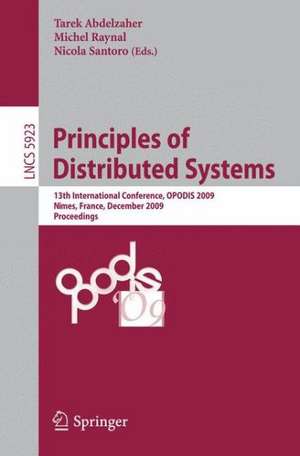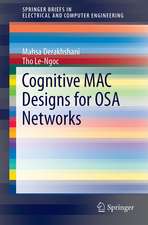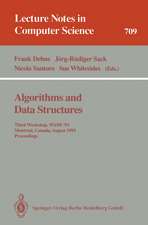Principles of Distributed Systems: 13th International Conference, OPODIS 2009, Nîmes, France, December 15-18, 2009. Proceedings: Lecture Notes in Computer Science, cartea 5923
Editat de Tarek F. Abdelzaher, Michel Raynal, Nicola Santoroen Limba Engleză Paperback – dec 2009
Din seria Lecture Notes in Computer Science
- 20%
 Preț: 1061.55 lei
Preț: 1061.55 lei - 20%
 Preț: 307.71 lei
Preț: 307.71 lei - 20%
 Preț: 438.69 lei
Preț: 438.69 lei - 20%
 Preț: 579.30 lei
Preț: 579.30 lei -
 Preț: 410.88 lei
Preț: 410.88 lei - 17%
 Preț: 427.22 lei
Preț: 427.22 lei - 20%
 Preț: 596.46 lei
Preț: 596.46 lei - 15%
 Preț: 448.04 lei
Preț: 448.04 lei - 20%
 Preț: 353.50 lei
Preț: 353.50 lei -
 Preț: 389.49 lei
Preț: 389.49 lei - 20%
 Preț: 309.90 lei
Preț: 309.90 lei - 20%
 Preț: 645.28 lei
Preț: 645.28 lei - 20%
 Preț: 763.23 lei
Preț: 763.23 lei - 15%
 Preț: 580.46 lei
Preț: 580.46 lei - 20%
 Preț: 310.28 lei
Preț: 310.28 lei - 20%
 Preț: 655.02 lei
Preț: 655.02 lei - 20%
 Preț: 1183.14 lei
Preț: 1183.14 lei - 20%
 Preț: 340.32 lei
Preț: 340.32 lei -
 Preț: 449.57 lei
Preț: 449.57 lei - 20%
 Preț: 591.51 lei
Preț: 591.51 lei - 18%
 Preț: 938.83 lei
Preț: 938.83 lei - 20%
 Preț: 337.00 lei
Preț: 337.00 lei - 20%
 Preț: 649.50 lei
Preț: 649.50 lei - 20%
 Preț: 607.40 lei
Preț: 607.40 lei - 20%
 Preț: 1414.79 lei
Preț: 1414.79 lei - 20%
 Preț: 1024.44 lei
Preț: 1024.44 lei - 20%
 Preț: 583.40 lei
Preț: 583.40 lei - 20%
 Preț: 453.32 lei
Preț: 453.32 lei - 20%
 Preț: 575.49 lei
Preț: 575.49 lei - 20%
 Preț: 1075.26 lei
Preț: 1075.26 lei - 20%
 Preț: 585.88 lei
Preț: 585.88 lei - 20%
 Preț: 825.93 lei
Preț: 825.93 lei - 17%
 Preț: 360.20 lei
Preț: 360.20 lei - 20%
 Preț: 763.23 lei
Preț: 763.23 lei - 20%
 Preț: 340.32 lei
Preț: 340.32 lei - 20%
 Preț: 504.58 lei
Preț: 504.58 lei - 20%
 Preț: 369.13 lei
Preț: 369.13 lei - 20%
 Preț: 580.93 lei
Preț: 580.93 lei - 20%
 Preț: 343.62 lei
Preț: 343.62 lei - 20%
 Preț: 350.21 lei
Preț: 350.21 lei - 20%
 Preț: 583.40 lei
Preț: 583.40 lei - 20%
 Preț: 583.40 lei
Preț: 583.40 lei - 15%
 Preț: 438.59 lei
Preț: 438.59 lei - 20%
 Preț: 341.95 lei
Preț: 341.95 lei - 20%
 Preț: 238.01 lei
Preț: 238.01 lei - 20%
 Preț: 538.30 lei
Preț: 538.30 lei
Preț: 338.68 lei
Preț vechi: 423.35 lei
-20% Nou
Puncte Express: 508
Preț estimativ în valută:
64.81€ • 70.38$ • 54.44£
64.81€ • 70.38$ • 54.44£
Carte tipărită la comandă
Livrare economică 22 aprilie-06 mai
Preluare comenzi: 021 569.72.76
Specificații
ISBN-13: 9783642108761
ISBN-10: 3642108768
Pagini: 373
Ilustrații: XIII, 373 p.
Dimensiuni: 155 x 235 x 23 mm
Greutate: 0.59 kg
Ediția:2009
Editura: Springer Berlin, Heidelberg
Colecția Springer
Seriile Lecture Notes in Computer Science, Theoretical Computer Science and General Issues
Locul publicării:Berlin, Heidelberg, Germany
ISBN-10: 3642108768
Pagini: 373
Ilustrații: XIII, 373 p.
Dimensiuni: 155 x 235 x 23 mm
Greutate: 0.59 kg
Ediția:2009
Editura: Springer Berlin, Heidelberg
Colecția Springer
Seriile Lecture Notes in Computer Science, Theoretical Computer Science and General Issues
Locul publicării:Berlin, Heidelberg, Germany
Public țintă
ResearchCuprins
Invited Talks.- Transactional Memory Today: A Status Report.- Navigating the Web 2.0 with Gossple.- Distributed Scheduling.- Transactional Scheduling for Read-Dominated Workloads.- Performance Evaluation of Work Stealing for Streaming Applications.- Not All Fair Probabilistic Schedulers Are Equivalent.- Brief Announcement: Relay: A Cache-Coherence Protocol for Distributed Transactional Memory.- Distributed Robotics.- Byzantine Convergence in Robot Networks: The Price of Asynchrony.- Deaf, Dumb, and Chatting Asynchronous Robots.- Synchronization Helps Robots to Detect Black Holes in Directed Graphs.- Fault and Failure Detection.- The Fault Detection Problem.- The Minimum Information about Failures for Solving Non-local Tasks in Message-Passing Systems.- Enhanced Fault-Tolerance through Byzantine Failure Detection.- Wireless and Social Networks.- Decentralized Polling with Respectable Participants.- Efficient Power Utilization in Multi-radio Wireless Ad Hoc Networks.- Adversarial Multiple Access Channel with Individual Injection Rates.- Synchronization.- NB-FEB: A Universal Scalable Easy-to-Use Synchronization Primitive for Manycore Architectures.- Gradient Clock Synchronization Using Reference Broadcasts.- Brief Announcement: Communication-Efficient Self-stabilizing Protocols for Spanning-Tree Construction.- Storage Systems.- On the Impact of Serializing Contention Management on STM Performance.- On the Efficiency of Atomic Multi-reader, Multi-writer Distributed Memory.- Abortable Fork-Linearizable Storage.- Distributed Agreement.- On the Computational Power of Shared Objects.- Weak Synchrony Models and Failure Detectors for Message Passing (k-)Set Agreement.- Unifying Byzantine Consensus Algorithms with Weak Interactive Consistency.- Distributed Algorithms.- Safe and Eventually Safe: Comparing Self-stabilizing and Non-stabilizing Algorithms on a Common Ground.- Proactive Fortification of Fault-Tolerant Services.- Robustness of the Rotor-router Mechanism.- Brief Annoucement: Analysis of an Optimal Bit Complexity Randomised Distributed Vertex Colouring Algorithm.- Brief Annoucement: Distributed Swap Edges Computation for Minimum Routing Cost Spanning Trees.
Textul de pe ultima copertă
This book constitutes the refereed proceedings of the 13th International Conference on Principles of Distributed Systems, OPODIS 2009, held in Nimes, France, in December 2009.
The 23 full papers and 4 short papers presented were carefully reviewed and selected from 72 submissions. The papers are organized in topical sections on distributed scheduling, distributed robotics, fault and failure detection, wireless and social networks, synchronization, storage systems, distributed agreement, and distributed algorithms.
The 23 full papers and 4 short papers presented were carefully reviewed and selected from 72 submissions. The papers are organized in topical sections on distributed scheduling, distributed robotics, fault and failure detection, wireless and social networks, synchronization, storage systems, distributed agreement, and distributed algorithms.




























